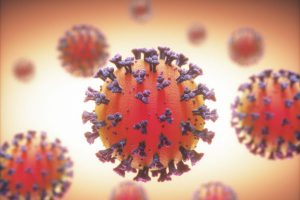
COVID-19, Coronavirus, group of viruses that cause diseases in mammals and birds. In humans, the virus causes respiratory infections. 3D illustration.
Engineers at the University of Texas, Austin recently created the ‘lab-on-a-chip’ platform, a portable disease diagnosis platform which could spot asymptomatic COVID-19 cases, as well as test for other ailments in their early stages.
The platform is capable of detecting tiny amounts of virus in a sample. A single chip can test hundreds of patients quicker than current testing methods.
‘Instead of having to bring people to hospitals, which isn’t always doable in remote areas, we can bring the hospital to the people,’ said Ray Chen, Professor in the Cockrell School of Engineering’s Department of Electrical and Computer Engineering.
The research team created a model of the platform with the aim of making it open in the market. Work had been going on the platform for over seven years. The researchers compared their work to other state-of-the-art methods in a paper published in Applied Physics Review, co-written by researchers at Austin-based Omega Optics, a startup by Chen.
The platform’s main advantage is its portability. Although there are other portable diagnostic products, Chen’s platform is more alike to clinical testing technology, but in a much smaller size.
The platform makes accurate diagnoses on highly diluted samples from people with tiny amounts of virus in their bodies. This is particularly important for the diagnosis of COVID-19 where many asymptomatic cases escape detection as a result of low viral load evading detection.
The system isn’t limited to COVID-19. It also better detects several types of cancer that is difficult to test for in its early stages. An effective way of treating cancer is catching it early which is why this model is very important.
‘Cancer is so detrimental because many times the detection of the cancer biomarker is coming too late’, Chen said. ‘In our testing machine, you can detect the biomarker at a much earlier stage, because we created a new method to enhance the interaction between the biomarker and light, which is key to detection.’
The system is also inexpensive to produce and easy to scale because of its reliance on silicon chips. It can test numerous nose/saliva swab samples on an individual chip. This greatly reduces cost.
Chen’s team obtained patents on several aspects of the platform. The biosensing system was developed across federally funded research projects. The researchers are currently on the hunt for manufacturing partners to carry on production and commercialization of the platform.
The biosensing system includes two key breakthroughs which makes it significantly more sensitive than other testing platforms. It can slow down how quickly light propagates, which increases detection capacity. The silicon chip possesses porous photonic crystal waveguides which encourage good interactions between light and biomarkers.
By Marvellous Iwendi.
Source: UT News